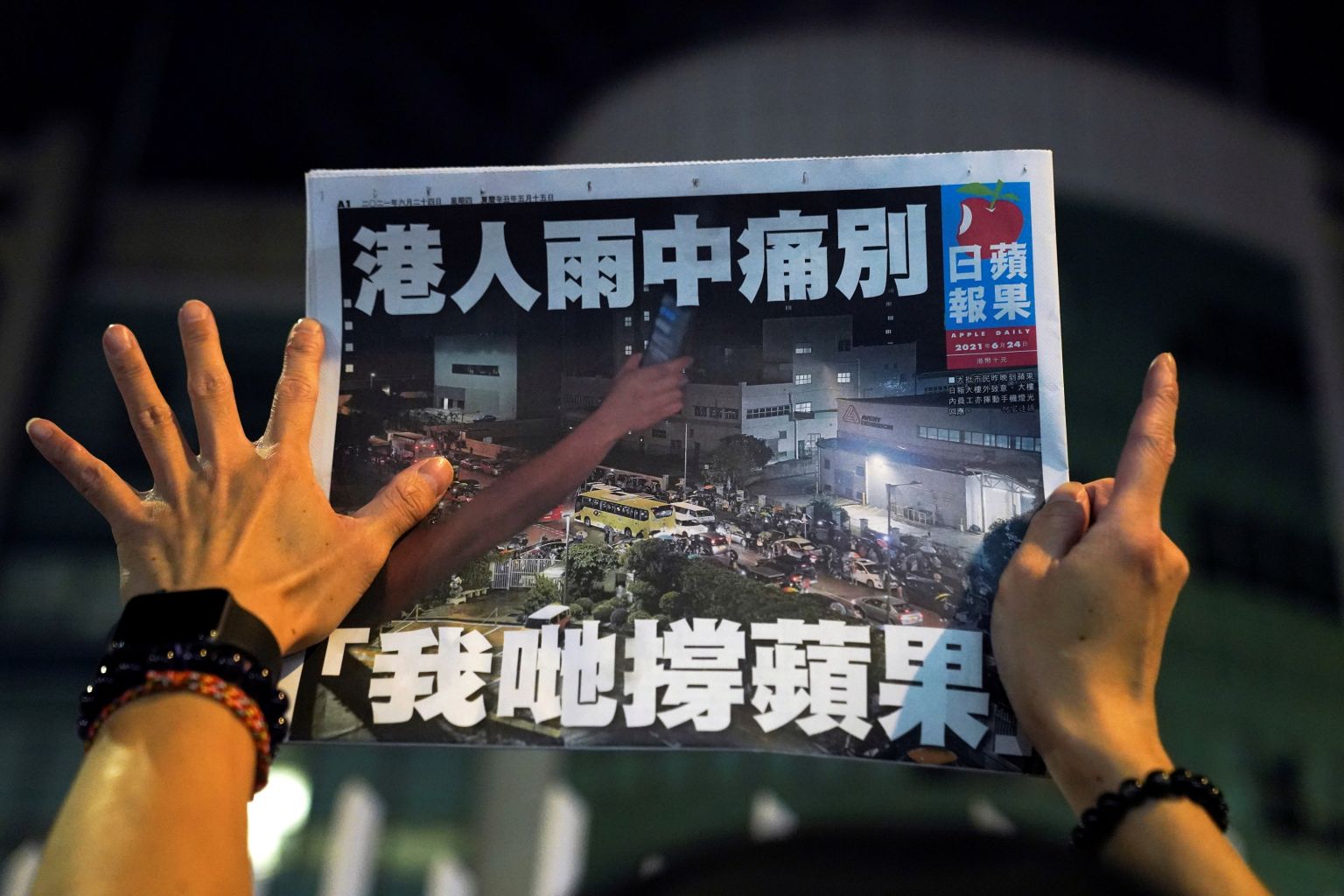US and allies condemn crackdown on Hong Kong's Apple Daily
Sign up now: Get ST's newsletters delivered to your inbox

A supporter gestures while holding the final edition of the Apple Daily in Hong Kong, China June 24, 2021.
PHOTO: REUTERS
Follow topic:
WASHINGTON (BLOOMBERG, XINHUA) - The United States and allies including Germany, Japan and Britain criticised a crackdown by Hong Kong authorities on the outspoken Apple Daily newspaper and its staff.
In a joint statement issued on Saturday (July 10) by the 21-country "Media Freedom Coalition", the governments condemned the use of a China-imposed National Security Law in Hong Kong to shut down the paper and arrest owner Jimmy Lai and staff.
They expressed "strong concerns" about the closing and warned about the potential of increased media censorship if further legislation is passed.
"The use of the National Security Law to suppress journalism is a serious and negative step which undermines Hong Kong's high degree of autonomy and the rights and freedoms of people in Hong Kong," according to the statement released by the US State Department.
It called on Hong Kong and Chinese authorities to uphold press freedom "in line with China's international legal obligations".
On Sunday, the Chinese Foreign Ministry's Office of the Commissioner in Hong Kong said it strongly disapproved and firmly opposed to the coalition's statement, which accused the judicial proceedings in Hong Kong, smeared the national security law in the city, and slandered the central government's policy towards Hong Kong.
"It is a gross interference in Hong Kong affairs and China's internal affairs, and is a blatant violation of the rule of law and judicial independence of (Hong Kong)," the spokesman of the office said.
The Apple Daily is a "poisoned apple" that has long engaged in illegal acts of harming the country and destabilising Hong Kong, seriously violating the journalistic ethics and jeopardising the media environment of Hong Kong, the spokesman said in the statement.
Relevant executives of the tabloid were suspected of colluding with external forces to endanger national security, and the action taken by the Hong Kong police force towards them in accordance with the law just serves them right, the spokesman added.
The action is a legitimate effort to safeguard the rule of law in Hong Kong and is a common aspiration of the Hong Kong people, which has nothing to do with freedom of the press and speech, the spokesman said.
The pro-democracy Apple Daily published its final edition on June 24 with people in Hong Kong rushing out to buy it in protest at the government crackdown.
The paper said it had been forced to cease publication after its bank accounts were frozen and top editors arrested for violating Hong Kong's national security law.
Apple Daily had built a 26-year reputation for hard-hitting investigations, unearthing the hidden wealth of high-ranking Chinese Communist Party leaders and exposing unethical practices of officials in Hong Kong. It was renowned for racy reporting and photos on entertainment, crime and celebrity gossip.
Lai, 73, has been jailed on charges linked to his backing for pro-democracy protests. His personal assets have been frozen, including shares in Apple Daily's parent Next Digital.
The statement on Saturday was signed by Australia, Austria, Canada, the Czech Republic, Denmark, Estonia, Finland, France, Germany, Iceland, Italy, Japan, Latvia, Lithuania, Luxembourg, Netherlands, New Zealand, Slovakia, Switzerland, Britain, and the US.
On Sunday, the Office of the Commissioner in Hong Kong said it is surprising that some members of the coalition tried to whitewash the lawless media outlet and relevant people who aimed to create disorder in Hong Kong and China at large, and attempted to exert pressure on law enforcement and judicial authorities of Hong Kong.
"What they have done is an insult to the rule of law and a serious violation of the media ethics," the office's spokesman said.
The spokesman stressed that press freedom is not an excuse for engaging in criminal acts, nor is it a fig leaf for external forces to interfere in Hong Kong affairs.
Some Western countries had a bad record in safeguarding human rights and press freedom, and certain media outlets in these countries fabricated fake news and staged farces by abusing press freedom and press privilege, the spokesman said, noting that only a few members of the so-called coalition represent neither the vast majority of the international community nor the mainstream voice of international public opinion.
The spokesman urged the coalition to abide by international law and basic norms governing international relations, stop endorsing anti-China, destabilising forces in Hong Kong, and stop interfering in Hong Kong affairs and China's internal affairs under the pretext of press freedom.

